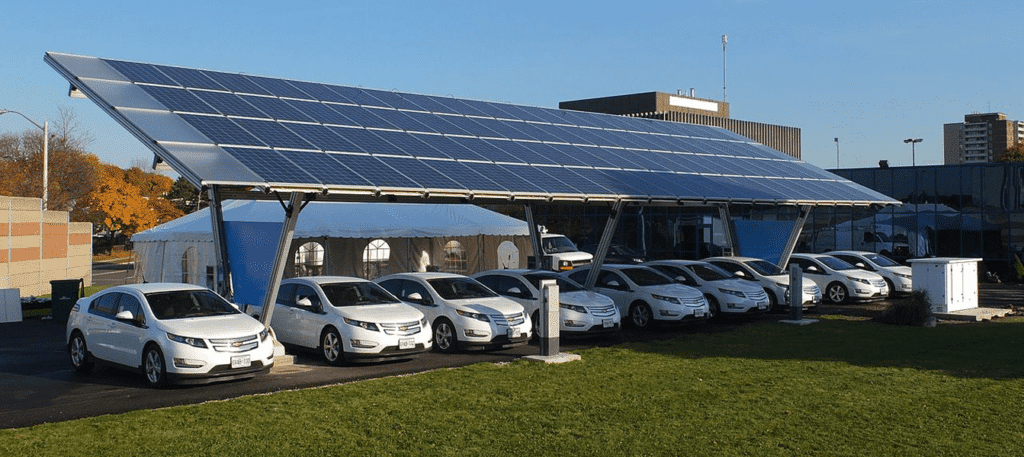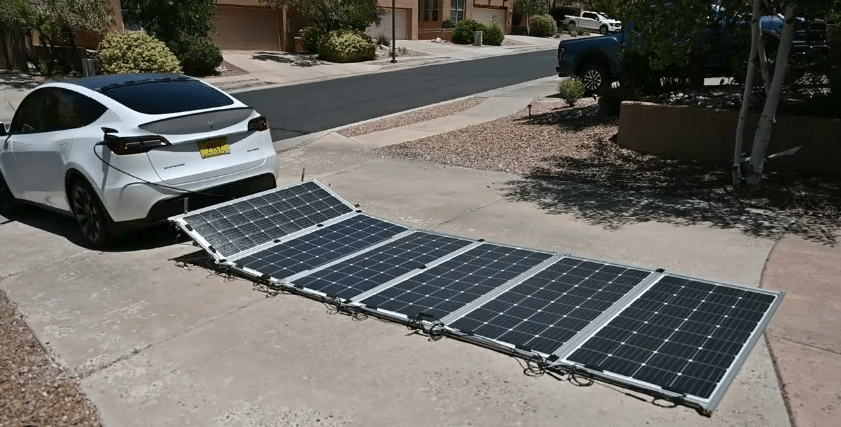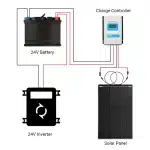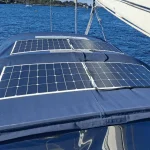Table of Contents
- Benefits of Charging an Electric Vehicle with Solar Panels
- Choosing The Right Flexible Solar Panel for Car Roof
- Limitations and Considerations for Solar-Powered EV Charging
- How to Effectively Charge an Electric Car with Solar Energy
- Comparing the Cost of Solar Charging vs Other Fueling Methods
- Exploring EVs with Built-in Solar Panels
- Maximizing Government Incentives for Solar and EVs
- Harnessing the Power of the Sun for Electric Vehicles
- Concluding Thoughts on EV Solar Panels
- FAQs
Table of Contents
Have you ever wondered how to combine renewable energy with your electric vehicle using a home solar power system? With many solar panels, you can generate electricity to power your electric vehicle. Imagine a world where your car not only runs on clean electricity but also charges itself using the power of the sun with home solar. This is made possible by installing many solar panels, which are part of a solar energy system. These solar panel systems harness the sun’s energy to provide sustainable power for your electric vehicle. Sounds like an IRA example out of a science fiction movie, right? The production and math involved in this scenario are mind-boggling. Well, it’s closer to reality than you might think.
EV solar panels, also known as flexible solar panel systems for electric vehicles, provide a sustainable and environmentally friendly charging solution. These panels can be used to charge electric vehicles using grid energy or a portable power station, such as a mobile charger. By harnessing the power of the sun through watt panels installed on your EV, you can effectively reduce your carbon footprint while enjoying the benefits of an eco-conscious lifestyle. Additionally, electric vehicle charging with a mobile charger allows for convenient and efficient charging, while also saving on grid energy consumption.
But what exactly are EV solar panels and how do they work? EV solar panels are a type of portable power station that harnesses grid energy to charge mobile devices, such as mobile chargers. These panels have a watt rating that determines their power output. These innovative systems allow you to convert sunlight into electricity that can be used to power your electric vehicle. With the help of a mobile charger, you can conveniently charge your car using solar energy. The watt and kWh measurements ensure efficient energy conversion. With advancements in technology, solar power systems have become more efficient and affordable, making them an attractive option for environmentally-conscious drivers looking to charge their mobile devices or power their cars. Additionally, investing in a solar power system can also qualify drivers for clean vehicle credits.
We’ll delve into the benefits of EV solar panels and discuss how they can contribute to a greener future by providing portable power for mobile chargers. Additionally, we’ll explore their watt and kWh capabilities. So get ready to discover how you can take advantage of this exciting fusion of renewable energy, electric vehicles, and portable power! With the increasing popularity of electric cars, having a mobile charger in your car is essential. This allows you to charge your vehicle on the go and ensures you always have enough power. Additionally, it’s important to understand the energy consumption of your car, measured in kilowatt-hours (kWh), to effectively manage your charging needs.
Benefits of Charging an Electric Vehicle with Solar Panels
Reducing Carbon Emissions
Charging an electric vehicle (EV) with solar panels is a fantastic way to reduce carbon emissions and contribute to a cleaner environment. It allows you to charge your EV using portable power, which is measured in kilowatt-hours (kWh). Plus, you can even earn credits for the excess energy generated by your solar panels. By harnessing the power of the sun, you can charge your electric vehicle (EV) without relying on electricity generated from fossil fuels. This not only reduces your carbon footprint but also helps you qualify for clean vehicle credit while saving on kilowatt-hours (kWh) of energy. Traditional methods of charging a car often involve burning fossil fuels, which release harmful greenhouse gases into the atmosphere, contributing to climate change. Charging a car typically requires a certain amount of kilowatt-hours (kWh) and can be paid for using a credit card. However, when you charge your EV using solar panels, you significantly decrease your carbon footprint and help combat global warming.
Solar-powered car charging not only benefits the environment but also has financial advantages for EV owners. By utilizing clean energy from the sun, you can lower your electricity costs and also reduce your carbon footprint. This is especially beneficial for car owners who want to save money on fuel expenses and contribute to a greener environment. When your solar panels generate excess energy during daylight hours, it can be stored in car batteries or fed back into the car grid for credits. These credits can offset the cost of charging your car at night or during cloudy days when solar production may be limited. Investing in solar panels for charging your electric car (EV) can lead to substantial savings on your electricity bills over time.
Choosing The Right Flexible Solar Panel for Car Roof
Of course, there is another way, which is to install it on the roof of the car, which is also an extremely convenient way to charge the car. When choosing flexible solar panels, the area of the car roof, its load-bearing capacity, and aesthetics need to be considered. Generally speaking, the area of a car roof is around 1-2 square meters and the weight-bearing capacity is around 50-100 kg. Therefore, it is necessary to choose the appropriate flexible solar panel specifications so that it can cover enough area without exceeding the load-bearing limit of the car roof. Also, the color and style of the flexible solar panel need to be considered so that it coordinates with the overall style of the car. Choosing The Right Flexible Solar Panel for Car Roof
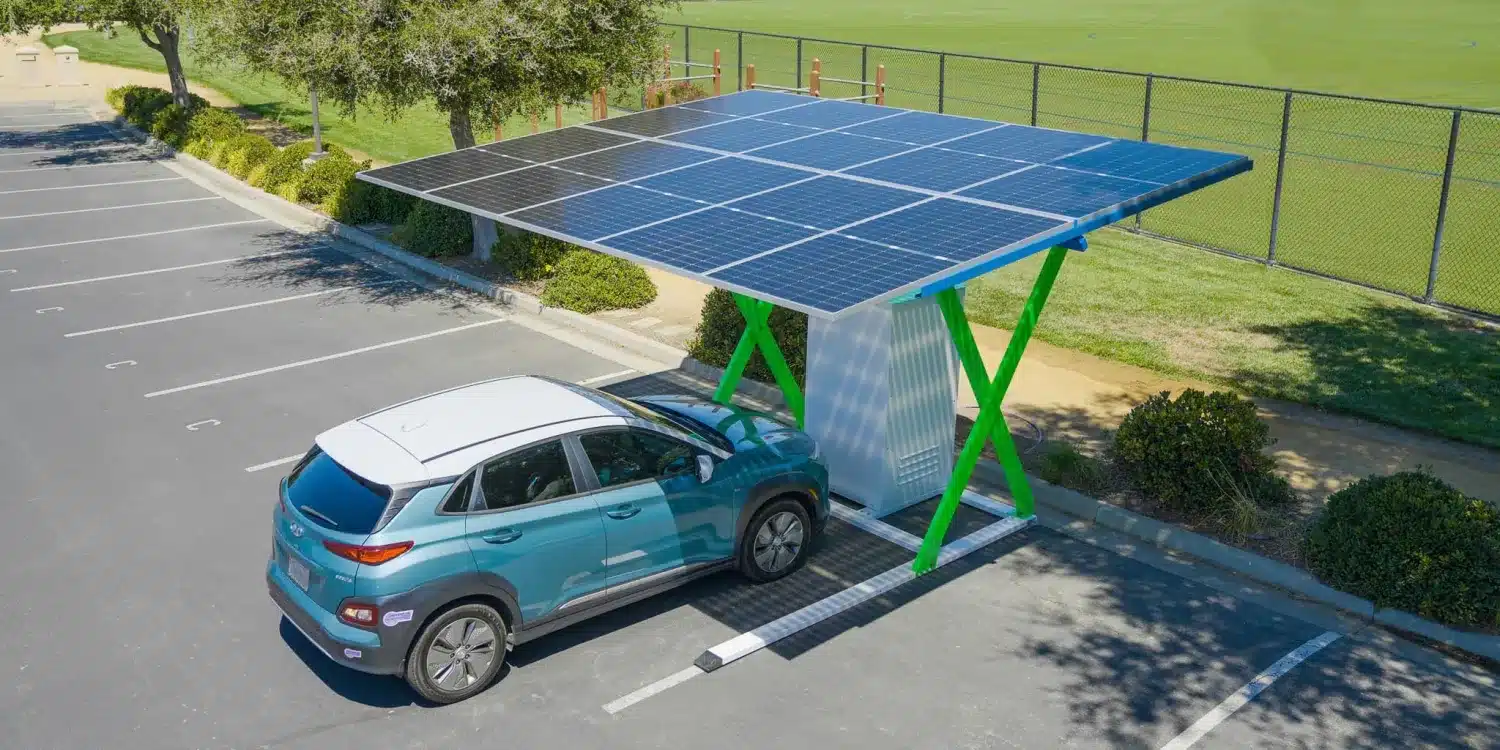
Promoting Energy Independence
Another significant benefit of using solar energy for charging electric vehicles is promoting energy independence for car owners. With traditional public car charging stations, there is a level of dependency on external car infrastructures and their car reliability. However, by installing solar panels at home or work specifically for EV charging purposes, you gain control over your car’s energy supply.
By generating clean energy from sunlight and utilizing it to charge your EV directly at home or work, you become less reliant on public charging infrastructure. This reduces the need to search for available public chargers and eliminates any concerns about compatibility issues with different charger types or payment systems. During power outages or emergencies when public chargers may be unavailable due to grid failures, having a solar-powered system ensures that you still have access to reliable and sustainable transportation.
Moreover, embracing solar-powered EV charging contributes to energy independence at a broader level. As more individuals adopt this approach, it reduces the strain on the electrical grid and decreases the demand for electricity from conventional power plants. This shift towards decentralized solar-powered charging systems fosters a more resilient and sustainable energy ecosystem.
Limitations and Considerations for Solar-Powered EV Charging
Limited sunlight availability affects the efficiency of solar charging.
Let’s face it, Sunshine is what powers solar panels. So, it goes without saying that limited sunlight availability can have a significant impact on the efficiency of solar-powered EV charging. Imagine a gloomy day with dark clouds looming overhead – not exactly the ideal conditions for harnessing solar energy.
On days like these, when the sun decides to take a break behind those stubborn clouds, your solar panels won’t be able to generate as much electricity. This means that your EV might not receive the full charge it needs to keep you cruising along smoothly. It’s essential to consider this limitation if you’re relying solely on solar power for your electric vehicle.
However, don’t despair just yet! While limited sunlight availability does pose a challenge, there are ways to mitigate its effects. One option is to install additional solar panels to compensate for lower energy production during cloudy periods. By increasing the surface area of your solar array, you can capture more sunlight even when it’s less abundant.
Another solution lies in advancements in battery technology. By investing in high-capacity batteries capable of storing excess energy generated during sunny days, you can ensure uninterrupted charging even when sunlight is scarce. These batteries serve as reservoirs for surplus electricity and release it when needed – like a backup generator for your EV.
The initial cost of installing solar panels can be high.
Ah, yes – money talks! Unfortunately, one of the limitations associated with installing solar panels for EV charging is their initial cost. Let’s be honest; going green sometimes comes at a premium price tag. The installation expenses involved in setting up a robust and efficient solar panel system can be substantial.
But before you cross “solar-powered EV charging” off your wish list due to budget constraints, let’s consider some long-term benefits that may outweigh this initial investment. Firstly, solar energy is renewable and abundant, meaning you won’t be reliant on fluctuating fuel prices or grid electricity. Over time, the savings on traditional fuel costs can help offset the upfront expenses.
Moreover, many governments and organizations offer incentives and tax credits to encourage the adoption of solar power. These financial perks can significantly reduce the overall cost of installing solar panels for EV charging. So, while it may require a significant initial investment, going solar can pay off in the long run both financially and environmentally.
Battery storage is crucial for uninterrupted charging during cloudy days.
Picture this: You wake up one morning eager to hit the road in your electric vehicle – but alas, dark clouds have taken over the sky. With limited sunlight available to power your solar panels efficiently, how will you ensure uninterrupted charging? The answer lies in battery storage.
Battery storage serves as a vital component of any solar-powered EV charging system. It allows you to store excess energy generated during sunny periods and use it when sunlight is scarce.
How to Effectively Charge an Electric Car with Solar Energy
Install a home solar panel system for convenient and efficient charging.
Harnessing the power of the sun is not only good for the environment but also a smart way to charge your electric car. By installing a home solar panel system, you can generate clean and renewable energy right at your doorstep. Imagine having your own personal power station that charges your vehicle while you sleep! It’s like waking up to a full tank of gas every morning, without the harmful emissions.
With advancements in solar technology, setting up a home solar panel system has become more accessible and affordable than ever before. You can choose from various options such as rooftop panels or ground-mounted systems depending on your space availability and preferences. The installation process typically involves mounting the solar panels, connecting them to an inverter that converts sunlight into usable electricity, and integrating it with your existing electrical system.
Once installed, the solar panels will start generating electricity whenever sunlight hits them. This means you’ll have a constant supply of clean energy to charge your electric vehicle without relying on traditional power sources. Not only does this reduce your carbon footprint, but it also provides long-term savings by reducing or eliminating your dependence on grid electricity.
Utilize smart-charging technology to optimize solar energy usage.
To make the most out of your EV solar panel setup, consider incorporating smart charging technology into your charging infrastructure. Smart chargers are designed to intelligently manage the flow of electricity between your solar panels, battery storage (if applicable), and electric vehicle. They ensure efficient utilization of available sunlight by automatically adjusting charging rates based on real-time data.
Smart chargers can communicate with weather forecasts and monitoring systems to determine when there’s an abundance of sunlight during peak hours. This allows them to prioritize charging during optimal conditions, maximizing the amount of solar energy used for powering up your electric vehicle. By leveraging intelligent algorithms and connectivity features, these chargers can adapt to changing weather patterns and adjust charging schedules accordingly.
In addition to optimizing solar energy usage, smart chargers also offer features like load balancing and remote monitoring. Load balancing ensures that your home’s electrical system doesn’t get overloaded when multiple appliances are running simultaneously. Remote monitoring allows you to keep track of your charging sessions, energy consumption, and even control the charger using a smartphone app. These advanced functionalities provide convenience, control, and peace of mind while charging your electric car with solar power.
Time your vehicle’s charging schedule based on peak sunlight hours.
Timing is everything. By syncing your vehicle’s charging schedule with peak sunlight hours, you can ensure that you’re drawing maximum solar energy during the most productive times of the day. This means faster charging speeds and greater efficiency in utilizing renewable energy.
To determine the peak sunlight hours in your area, you can refer to local weather reports or use online tools specifically designed for this purpose.
Comparing the Cost of Solar Charging vs Other Fueling Methods
Saving Money with Solar Charging
Solar-powered EV charging offers a fantastic opportunity to save money compared to traditional fueling methods like gasoline or diesel. When you combine the power of solar panels with electric vehicles, long-term cost savings become a reality. Let’s dive into a comparison of the expenses associated with different fueling methods and see how solar charging stands out.
The High Energy Costs of Fossil Fuels
Reliance on fossil fuels can quickly drain your wallet. Gasoline prices fluctuate wildly, often leaving us wondering if we’re getting our money’s worth at the pump. On top of that, gas stations seem to raise their rates without warning, leaving us feeling helpless in the face of rising costs.
In contrast, solar charging provides a more stable and predictable energy source. By harnessing the power of sunlight, you can generate electricity for your EV without relying on fossil fuels or being at the mercy of ever-changing gas prices. With net metering programs in place in many areas, you can even sell excess electricity back to the grid and offset your costs further.
Crunching the Numbers: Solar Charging vs Gasoline
Let’s break down the costs involved in both solar charging and gasoline fueling methods:
-
Upfront Costs: Installing solar panels may require an initial investment, but they have become more affordable over time. There are government incentives and tax credits available that can help reduce these upfront costs.
-
Operating Costs: Once your solar panels are installed, you’ll enjoy reduced operating costs compared to purchasing gasoline regularly. While it may take some time to recoup your initial investment, over the long run, solar charging proves to be more economical.
-
Maintenance Costs: Solar panels require minimal maintenance compared to conventional vehicles that need regular oil changes and other upkeep expenses. This further contributes to the cost savings of solar charging.
-
Environmental Impact: Solar charging not only saves you money but also benefits the environment by reducing greenhouse gas emissions associated with burning fossil fuels. By choosing solar charging, you’re making a positive impact on both your wallet and the planet.
Solar Charging: A Bright Future for Cost Savings
When comparing the costs of solar charging to traditional fueling methods, it becomes clear that solar-powered EVs offer significant long-term savings potential. While upfront costs may seem daunting, they are often offset by government incentives and tax credits. Once your solar panels are installed, you’ll enjoy reduced operating and maintenance costs while contributing to a cleaner, more sustainable future.
So why continue paying exorbitant amounts at gas stations when you can harness the sun’s energy to power your vehicle? Take control of your energy costs and make the switch to solar charging today!
Note: Average rates and prices may vary depending on location and specific circumstances.
Exploring EVs with Built-in Solar Panels
Electric vehicles (EVs) have revolutionized the way we think about transportation. Not only do they offer a greener alternative to traditional gasoline-powered cars, but some EVs even come equipped with integrated solar panels for additional power generation.
Harnessing the Power of the Sun
One of the most exciting developments in the realm of EVs is the integration of solar panels directly into their design. These innovative vehicles are equipped with specially designed solar panel systems that harness sunlight and convert it into usable energy. The solar panels, often located on the roof or hood of the car, absorb sunlight through photovoltaic cells and convert it into electricity.
The primary advantage of having built-in solar panels is that they provide an additional source of power for your electric vehicle. While charging stations are becoming more prevalent, having access to renewable energy wherever you go is a game-changer. Whether you’re driving on a sunny day or parked outside your workplace, these solar panels continuously generate electricity, reducing your reliance on traditional charging methods.
A Closer Look at Solar-Powered EVs
Now let’s take a closer look at some electric cars that feature built-in photovoltaic technology:
-
Tesla Model S: Tesla has been at the forefront of electric vehicle innovation, and their Model S takes advantage of solar power as well. With its panoramic glass roof featuring embedded solar cells, this luxury sedan can generate additional electricity while on the move.
-
Lightyear One: The Lightyear One is an upcoming electric vehicle that boasts an impressive range thanks to its integrated solar panel system. Designed with efficiency in mind, this sleek car utilizes advanced technologies to maximize energy conversion from sunlight.
-
Hyundai Sonata Hybrid: The Hyundai Sonata Hybrid incorporates a solar roof system that helps recharge the car’s battery while driving or parked. This feature enhances the vehicle’s overall fuel efficiency and reduces its carbon footprint.
As you can see, these examples represent just a fraction of the EVs with built-in solar panels available in the market. With advancements in solar technology, we can expect to witness more manufacturers incorporating this eco-friendly feature into their electric vehicles.
The Benefits of Solar-Powered EVs
The integration of solar panels into electric vehicles brings forth several benefits for both drivers and the environment:
-
Extended Range: By harnessing the power of the sun, these EVs can potentially increase their range without solely relying on charging stations. This extended range offers greater flexibility for drivers, especially in areas where charging infrastructure may be limited.
-
Reduced Environmental Impact: Solar-powered EVs help reduce greenhouse gas emissions by utilizing renewable energy sources. By choosing to drive an electric vehicle with built-in solar panels, you contribute to a cleaner and greener future.
Maximizing Government Incentives for Solar and EVs
Educate Yourself About Available Government Incentives
The first step is to educate yourself about the available options. By staying informed, you can take advantage of various tax credits, rebates, and grants offered by local authorities. These incentives are designed to encourage individuals and businesses to adopt clean energy solutions such as solar panels and EVs.
One significant incentive to be aware of is the federal solar tax credit. This credit allows you to deduct a portion of the cost of installing a solar system from your federal income taxes. The amount you can claim depends on the size of your system and when it was installed. For example, in 2021, the solar tax credit allows for a 26% deduction, but it is set to decrease in subsequent years. By understanding these details, you can plan your installation accordingly to maximize your savings.
Similarly, there is also an electric vehicle tax credit at the federal level. If you purchase an eligible EV, you may qualify for a tax credit that can significantly reduce your overall cost. However, it’s important to note that this credit has limitations based on factors such as battery capacity and manufacturer-specific thresholds. Being well-informed about these criteria will help you make an informed decision when purchasing an EV.
Take Advantage of Local Tax Credits, Rebates, and Grants
In addition to federal incentives, many states offer their own programs to further incentivize the adoption of clean energy solutions like solar panels and EVs. These state-level initiatives can include additional tax credits or rebates that supplement the federal benefits mentioned earlier.
For instance, some states provide specific incentives for installing solar systems through programs like Solar Renewable Energy Certificates (SRECs) or performance-based incentives (PBIs). SRECs allow homeowners or businesses with solar panels to earn credits for the electricity they generate, which can then be sold to utilities. PBIs, on the other hand, offer ongoing payments based on the amount of energy your solar system produces. By researching and understanding these state-level incentives, you can maximize your financial benefits.
Similarly, many states offer rebates or grants for purchasing electric vehicles. These incentives can vary in terms of eligibility criteria and the amount of financial assistance provided. Some states may offer direct cash rebates upon EV purchase, while others may provide grants for charging infrastructure installation or even exemption from certain fees and taxes related to owning an EV. Exploring these options will help you identify the most advantageous programs available in your state.
Leveraging Government and Non-Government Incentives for Solar Electric Vehicle Charging
As governments around the world accelerate their transition away from fossil fuels, many have begun actively incentivizing homeowners to install renewable energy sources, including solar panels. These incentives could take many forms, including direct subsidies that rebate a percentage of solar installation costs, more attractive energy tariffs through net metering schemes, tax rebates or reduced energy bill rates.
The UK, for example, offers guaranteed feed-in tariffs to homeowners who install solar panels, ensuring they can sell the energy produced by their panels to utility companies at an attractive price. The Netherlands also allows its residents to send energy generated by solar back to the grid at full tariff, while many U.S. states offer subsidies and tax credits on top of federal rebates.
In some countries, NGOs with green energy goals may also offer various grants and incentives to homeowners keen to charge their electric vehicles with residential solar power.
Incentives for domestic EV solar charging schemes vary widely by country, region and local authority, but in general they can significantly reduce the cost of installing solar panels on a home. Keep in mind that in addition to incentives for solar, many countries offer various benefits for installing electric vehicle charging stations, which can further reduce costs if you use solar energy to charge your electric vehicle.
Harnessing the Power of the Sun for Electric Vehicles
The use of solar power in charging electric vehicles (EVs) has gained significant attention in recent years. By harnessing the energy from the sun, EV owners can enjoy a renewable and sustainable source of power for their vehicles.
Solar Power: A Renewable Energy Source for EVs
Solar power systems offer a clean and abundant source of energy that is free from greenhouse gas emissions. By installing solar panels on rooftops or utilizing open spaces, individuals can generate electricity directly from sunlight. This renewable energy can then be used to charge electric cars, reducing our dependence on conventional energy sources.
One of the key advantages of using solar power for EV charging is its sustainability. Unlike fossil fuels, which are finite resources with harmful environmental impacts, sunlight is readily available and does not produce any harmful byproducts during energy production. This means that as long as the sun continues to shine, we have an almost limitless supply of clean energy to power our electric vehicles.
Reducing Reliance on Fossil Fuels
The adoption of solar-powered EV chargers helps decrease our reliance on fossil fuels for transportation needs. Traditionally, most electric cars are charged using electricity generated from coal-fired power plants or natural gas facilities. These sources contribute to air pollution and carbon emissions.
By integrating solar panels into the charging infrastructure, we can tap into a greener alternative that reduces our carbon footprint significantly. When an EV charges directly from a solar power system during daylight hours, it effectively eliminates the need to draw electricity from conventional grids powered by non-renewable sources.
Converting Sunlight into Electricity: How It Works
Solar panels work by converting sunlight into usable electricity through a process known as photovoltaic (PV) conversion. These panels are made up of multiple solar cells, which consist of semiconductor materials like silicon. When sunlight hits the surface of a solar cell, it excites the electrons within the material, generating an electric current.
To charge an electric car using solar power, the electricity generated by the solar panels is first stored in a battery system. This allows for continuous charging even when there is no direct sunlight available. The stored energy can then be used to charge the EV’s battery or power other electrical components within the vehicle.
Maximizing Solar Energy for EV Charging
To maximize the benefits of solar energy for EV charging, several factors come into play. Here are some considerations to ensure efficient utilization of solar power:
-
Orientation and Tilt: Properly orienting and tilting solar panels towards the sun’s path can optimize their exposure to sunlight throughout the day.
-
Panel Efficiency: Investing in high-efficiency solar panels ensures maximum conversion of sunlight into electricity.
-
Battery Storage
Concluding Thoughts on EV Solar Panels
So there you have it, all the ins and outs of charging your electric vehicle with solar panels. It’s clear that there are numerous benefits to harnessing the power of the sun for your EV charging needs. Not only can you save money on fuel costs, but you’ll also be reducing your carbon footprint and contributing to a more sustainable future. Plus, with government incentives available for both solar energy and electric vehicles, now is the perfect time to make the switch.
But before you jump in headfirst, it’s important to consider some limitations and factors that may affect your decision. From the initial cost of installation to potential weather-related challenges, there are a few things to keep in mind. If you’re not able to install solar panels at your home or workplace, don’t worry! There are still options available for charging your EV using renewable energy sources.
So why wait? Start reaping the benefits of clean and affordable transportation today by exploring how solar panels can power your electric vehicle!


